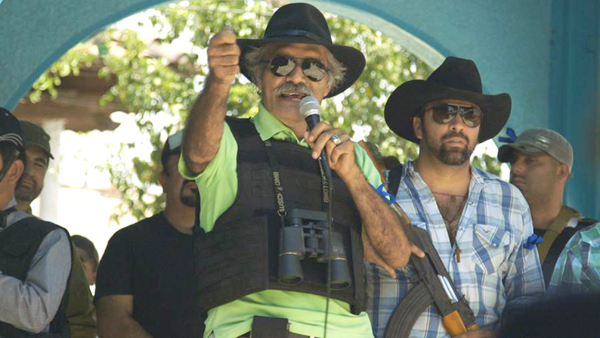Organized vigilantes have arisen on both sides of the U.S./Mexico border out of frustration with what they see as inadequate government response to the violent cartels terrorizing farmers and ranchers and smuggling drugs and people. Director Matthew Heineman embedded with their quasi-military activities for five months to get to know their leaders, motivations, and modus operandi. Filmed close-up in what he calls “run-and-gun verité,” he, like a war journalist, captures the positives of their grassroots community organizing, as well as their far scarier prejudices that can lead to anarchy and corruption. At this year’s Sundance Film Festival, Heineman was awarded for best direction and cinematography in the U.S. documentary competition.
In the United States, he follows Tim “Nailer” Foley, a skinny, hard-bitten, tattooed veteran of the Army’s 82nd Airborne, who heads the fully armed volunteer Arizona Border Recon, which Heineman found through a Rolling Stone story, “Border of Madness.” Preparing for night patrols along the 52 miles of the Altar Valley desert in Arizona, Foley first rails against “IAs” (illegal aliens), blaming them for his construction job layoff that led to losing his house in foreclosure. While brandishing AK-47s, he and his group roughly round migrants up and hold them for border agents.
Foley visibly softens in dealing with the captured as he provides them with water, but he turns his wrath on the cartels profiting off their hopes and miseries and for bringing drug violence up north. Though these scenes are formless and wandering, it is fascinating as he explains, in military tactics and strategic terms, how he seeks out the cartel scouts who navigate the routes and focuses his group’s efforts to apprehend them.
In the southwestern Mexican state of Michoacán, there is even more frustration over the mounting toll from drug violence and extortion, specifically caused by the powerful Knights Templar drug cartel, and more disgust at the government’s impotence, what with assassinations of officials and the deaths of thousands of civilians caught in the middle. Up rises a towering, charismatic, cinematic hero, Dr. José Manuel Mireles, as first profiled in The Wall Street Journal. He sweeps into towns with his armed group, Autodefensa, as well as with T-shirts and the kindly medical clinic services he provides as “el Doctor.”
He and his men forcefully hunt down alleged cartel members and chase them out beyond the sandbagged checkpoints—rarely peacefully (and Heineman is right there when the bullets fly). But just when you start thinking that maybe his extreme measures could be justified in this extreme situation, Mireles flaunts his above-the-law lack of ethics and morals so brazenly to the camera that the dangers of unchecked vigilantism become frighteningly clear.
There are brave and determined people attempting nonviolent solutions, as seen in Bill and Turner Ross’s more emotionally involving Western, a fully rounded documentary shown this year at New Directors/New Films and still making the festival rounds. Here, business and political leaders in the neighboring cities of Eagle Pass, Texas, and Piedras Negras, Mexico, risk their lives for peace and progress with specific projects for economic cooperation, so the triumph of violence is that much more cruelly disheartening.
Both films put faces on and give graphic immediacy to issues that can often get bogged down in depressing statistics and policy rhetoric. They serve as sobering warnings that solutions will not be simple.







Leave A Comment